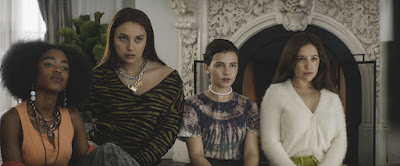Shiva Baby is so drenched in social anxiety — not to mention family obligations, professional frustrations, and sexual tension — that one could practically wring it out. The whole endeavor has a palpable feeling of discomfort, the camerawork close and ever-so-slightly trembling, the score spare stabbing strings, the dialogue surface pleasant, subtextually jabbing small talk of needling relatives gossiping and hesitant strangers networking. It takes place almost entirely at a shiva for a distant relative (someone’s second wife’s sister—that sort of thing) of our protagonist, a college senior (Rachel Sennott) whose various worlds are about to uncomfortably collide. Her future looks uncertain, graduating without good prospects, to the dismay of her mother (Polly Draper) who tells her to let the other mourners think she has interviews lined up. Her father (Fred Melamed) still pays her bills since her babysitting job is so erratically scheduled. And neither know that her alleged babysitting job is a cover story for her real meager source of income: meeting men on a sugar daddy app and getting some easy money for a good time. We start the movie at the end of her latest hookup with an older man (Danny Deferrari), the better to recognize him when he enters the house. Small world. His wife (Dianna Agron) and baby are meeting him there, too. The walls are closing in.
There’s a constant sense of teetering on the edge of potential embarrassment, and Sennott capably plays the squirm, blundering forward though her insecurities and realizing only too late each escalating cringe. The tension rises as she’s bolstered by craft that keeps her tightly framed and blocking that presses her into corners or into uncomfortable exposure. In this small gathering the rooms were already full of elderly family friends (like Jackie Hoffman) prying nicely or passive aggressively into her personal life, and her childhood best friend and first romantic partner (Molly Gordon) makes eyes at her, too. Now it's only more complicated. Writer-director Emma Seligman, in a striking debut feature, has the confidence to sustain this small, well-tuned picture — a mere 70-some minutes and just a wisp of plotting to carry it — by signaling the largely interior stakes through small gestures and flushes of discomfort. The movie’s all about eye lines and furtive glances, the cold sweat of conversational awkwardness and the tension between polite fictions and outright deceptions. All the while, the whole thing plays out like a prelude to a panic attack, emotionally edging right up to the brink of a psychological catastrophe that never quite erupts. It feels like an achingly real emotional state.
You never know where you’ll find that. For instance, I just caught up with writer-director Zoe Lister-Jones' The Craft: Legacy. Who’d have thought the couple decades belated sequel/remake of the cult teen coven classic would have some emotional truth in it? I didn’t. But there it is anyway. There’s a scene in the middle, a sort of Breakfast Club misfit confession circle, in which the star teen girls who dabble in witchcraft as a form of self-empowerment — but dangers lurk, because of course they do — talk with a former bullying boy from their school. He tearfully admits his closeted bisexuality and earnestly confesses to feeling stifled by gender norms. It’s a real bolt of interesting emotional valences that changes the temperature of the scene and resonates throughout the rest of the picture. The whole thing is an amiable teen flick, with lockers and house parties and cute montages and, befitting its horror roots, a bit of dark sinister intentions lingering underneath. There are a few good creepy moments, and fine parallel plots about our new-in-town lead girl (Cailee Spaeny) getting to know her new friends and her latent powers, and her single mother (Michelle Monaghan) finding a new beau, a masculinist self-help guru and maybe-cult-leader (David Duchovny). (Some shades of The Lost Boys, there, perhaps.)
So there’s decent contrast drawn between the girl-power witches and dark forces of misogyny, and there’s the usual stuff about crushes and classes and learning to grow into oneself inherent in the teen movie of any genre. It’s a consistent through line of inquiry connecting the boy’s troubles and the girls’, a frank admission that societal expectations can hurt everyone, even those who are theoretically built up by them. Even if the movie never quite leans all the way into horror — though there’s a bit with a figure in a mirror in a darkened bedroom that’s quite spooky — and there are fleeting moments where it feels like one of those featherlight Netflix Original buzzword Mad Libs pictures, the whole project has a consistent and pleasant earnestness about its characters that makes for a modestly enjoyable effort as it coasts to its routine conclusion.



No comments:
Post a Comment